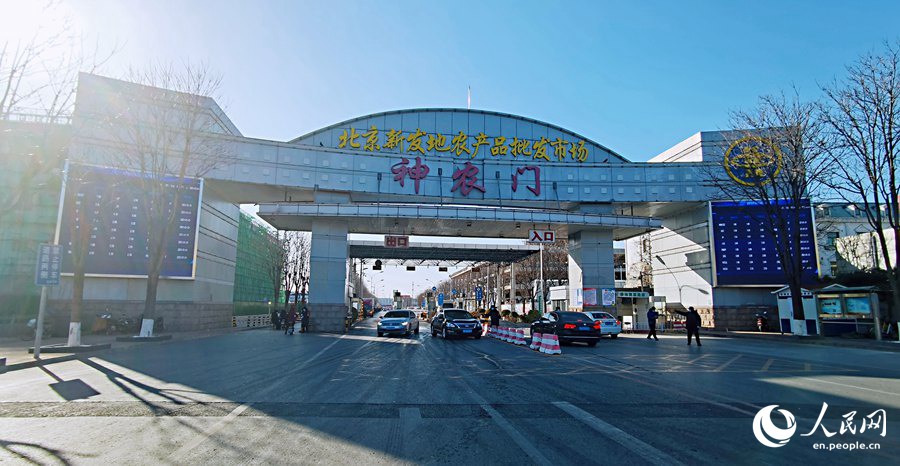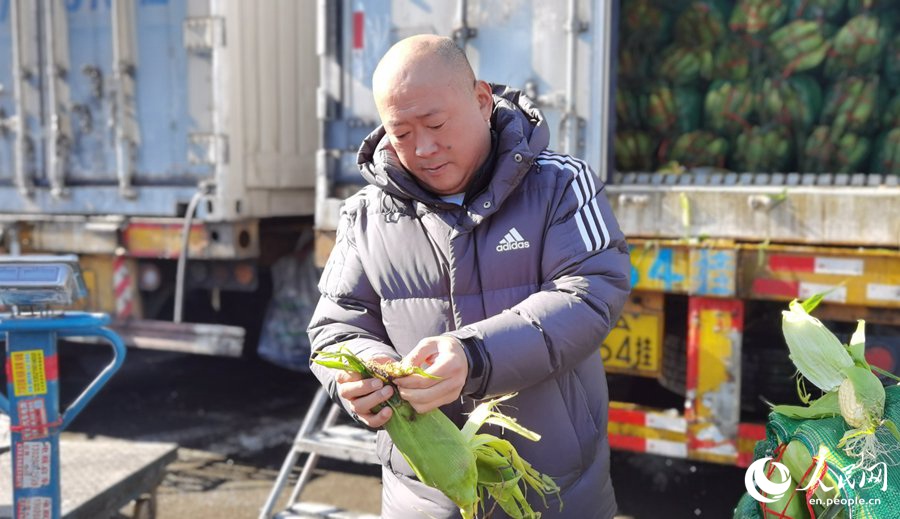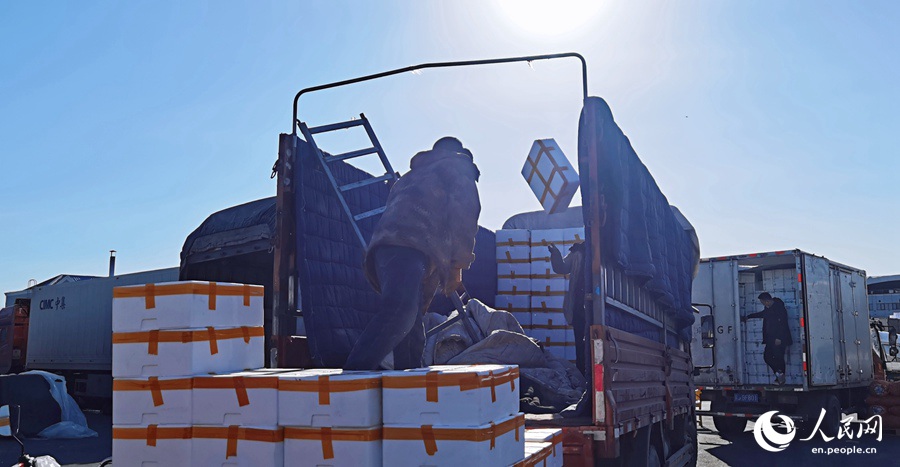


Photo taken on Feb. 1, 2021 shows the Shennong Gate of the Xinfadi market in Beijing. (People’s Daily Online/Xian Jiangnan)
It was 9:00 a.m. at the Xinfadi Market in southern Beijing, where it was full of vitality thronging with traders and bustling with trucks carrying various food items. Li Zhongyue, a wholesaler at the Market, was busy instructing employees to unload the corns from the trucks.
The Xinfadi Market, located in Beijing’s Fengtai District, is Asia’s largest seafood and agricultural wholesale market sprawling over 110 hectare, an area the size of almost 160 soccer fields. Dubbed the “vegetable basket and fruit bowl of Beijing,” it is a significant artery providing 90 percent of agricultural products consumed in the city’s restaurants and homes.
In mid-June last year, the market came to a sudden halt due to the emergence of COVID-19 cases, and has now restored its previous hustle and bustle, despite sporadic cases reported recently in several places in Beijing.
“The Xinfadi Market I’m familiar with has come back,” said Li.
Battle against the virus

Li Zhongyue checks an ear of corn on Feb. 1, 2021 at the Xinfadi Market in southern Beijing. (People’s Daily Online/Xian Jiangnan)
Hailed by his business partners as China’s “corn tycoon,” Li has been doing business at the market for over 26 years, focusing on the cultivation and trade of Chinese fruit corns.
Under normal conditions, Li sells an average of 150 tons of corn per day, with an annual income of 200 million yuan (about 31 million US dollars). According to him, about six out of every ten corns consumed in Beijing are from his company.
Things have changed since mid-June last year, which was supposed to be the best time for his business. After a 52-year-old local who had shopped there was diagnosed with COVID-19, the market, being the source of the new cluster of infections in Beijing, was completely shut down on June 13, 2020.
The losses were heavy for Li – on that day, 300 tons of corn ready to be sold were sealed up and later thrown out. He, together with his employees, underwent nearly one month of quarantine, after which he became a volunteer to help truck drivers and vegetable vendors to find new business opportunities.
Fortunately, neither he nor any of his employees got infected.
“The unexpected outbreak brought Xinfadi to a sudden halt, but we don’t blame anyone and are willing to obey the government’s arrangements,” Li said.
The timely recovery of the market exceeded Li’s expectation. On July 20, after Beijing reported zero new cases for 14 consecutive days, Xinfadi partially reopened, allowing sellers to trade at designated areas. On Sept. 6, the market fully reopened.
“Xinfadi’s swift recovery is an achievement attributed to the people’s selflessness, the government’s quick response and the market’s support,” Li said.
To the delight of wholesalers like Li, the market exempted them from administration fees, in order to reduce their operating costs.
At present, Xinfadi has instituted stringent precautionary measures while ensuring steady food supplies, such as setting up two 24-hour nucleic acid test stations, testing all market staff, traders and special food items, such as imported fruits, every seven days.
Li said he is required to go through temperature checks and show his Green Health Code as well as his Xinfadi membership code on WeChat before entering the market every day.
Since early January, local authorities organized vaccinations for the traders and employees at the market, with more than 8,300 people having been inoculated so far.
Gearing up for a special holiday

A wholesaler loads a box of agricultural food onto a truck on Feb. 1, 2021 at the Xinfadi Market in southern Beijing. (People’s Daily Online/Xian Jiangnan)
It’s under a week to go before China’s Spring Festival holiday, a long-awaited reunion time for most Chinese families. For Xinfadi traders like Li, the pandemic dampens their holiday cheer as most of them would stay put during the holiday.
“This year’s Spring Festival will be so different from the previous ones. The majority of us traders chose to stay here to prevent hassle to our families and to the government,” said Li, adding that this year, more than 5,000 traders at Xinfadi would stay put to provide food for Beijing residents, compared with around 2,000 last year.
But it’s not all that bad. As many people are deterred from making the journey home this year, an additional six to seven million people are expected to stay in Beijing, which will increase the demand for agricultural products during the holiday. “We have seen it as a good opportunity to earn more money,” Li added.
According to Zhang Yuxi, head of the Xinfadi Market, Xinfadi’s 77 stores and 211 vans, covering a total of 984 communities in Beijing, will remain open during the holiday to safeguard the food supply for the people.
Li said he has prepared adequate corns, with an expected sales growth by as much as 30 percent over last year.
“I’m confident of a rewarding holiday,” Li said.

 Award-winning photos show poverty reduction achievements in NE China's Jilin province
Award-winning photos show poverty reduction achievements in NE China's Jilin province People dance to greet advent of New Year in Ameiqituo Town, Guizhou
People dance to greet advent of New Year in Ameiqituo Town, Guizhou Fire brigade in Shanghai holds group wedding
Fire brigade in Shanghai holds group wedding Tourists enjoy ice sculptures in Datan Town, north China
Tourists enjoy ice sculptures in Datan Town, north China Sunset scenery of Dayan Pagoda in Xi'an
Sunset scenery of Dayan Pagoda in Xi'an Tourists have fun at scenic spot in Nanlong Town, NW China
Tourists have fun at scenic spot in Nanlong Town, NW China Harbin attracts tourists by making best use of ice in winter
Harbin attracts tourists by making best use of ice in winter In pics: FIS Alpine Ski Women's World Cup Slalom
In pics: FIS Alpine Ski Women's World Cup Slalom Black-necked cranes rest at reservoir in Lhunzhub County, Lhasa
Black-necked cranes rest at reservoir in Lhunzhub County, Lhasa China's FAST telescope will be available to foreign scientists in April
China's FAST telescope will be available to foreign scientists in April